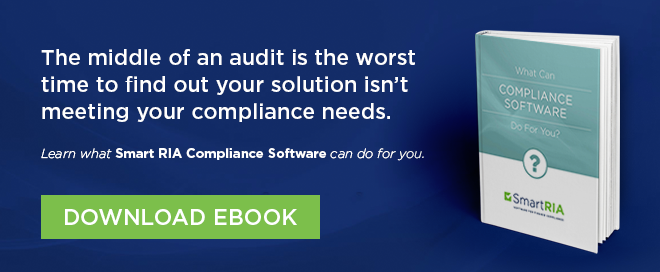
The Financial Industry Regulatory Authority, also known as FINRA, is not a governmental body like the SEC or state RIA regulators, but it still plays a major role in how RIA firms are run and overseen. FINRA is a private, non-profit, self-regulatory organization for broker-dealers. It operates on appointment by the SEC and can levy fines and other penalties on its members.
In other words, you want to stay on their good side.

FINRA got its start in 2007, when several private regulatory organizations, including the New York Stock Exchange and the National Association of Securities Dealers, merged with SEC approval to form a single organization.
It administers the filing system for Form ADV, the yearly regulatory filing for RIAs. However, RIAs are still regulated by either the SEC or states, depending on the dollar amount of assets under management (AUM).
While FINRA does not regulate or audit RIAs, it’s possible that you have a broker-dealer or someone else in your office working dual roles. Therefore, it’s important to know how a FINRA audit works and what to expect.
Just as RIAs must file form ADV each year, wealth management advisors under FINRA regulation have a yearly filing: SEC Form X-17A-5 Part III. This form contains the information gathered from annual audit by an outside, independent CPA and must be filed within 60 calendar days of fiscal year end.
The yearly audit under FINRA covers a lot of ground, including basic accounting of transactions. It requires you answer several pertinent questions to help establish compliance, including:
- How much did the firm or broker-dealer take in?
- How much went out?
- To where?
- Is there any evidence of theft?
Veracity of advertising is also examined, along with suitability of investments made on your clients’ behalf, and continuing education requirements for personnel.
This annual audit shouldn’t be confused with surprise FINRA examinations, also commonly known as audits, that work much like SEC or state audits of RIAs. FINRA exams can happen due to a targeted data point from the yearly filing, like amount of AUM, selected by FINRA. Or, they can happen for cause.
The purpose of a FINRA exam, just as with an RIA audit, is to make sure that information in yearly filings matches reality. The exam also addresses any non-compliance with FINRA standards.
Compliance requirements for investment professionals are constantly changing, so it’s in your best interests to stay informed about DOL and industry developments. More and more investment professionals are relying on compliance software solutions, like SmartRIA, to keep them audit-ready all year long.


